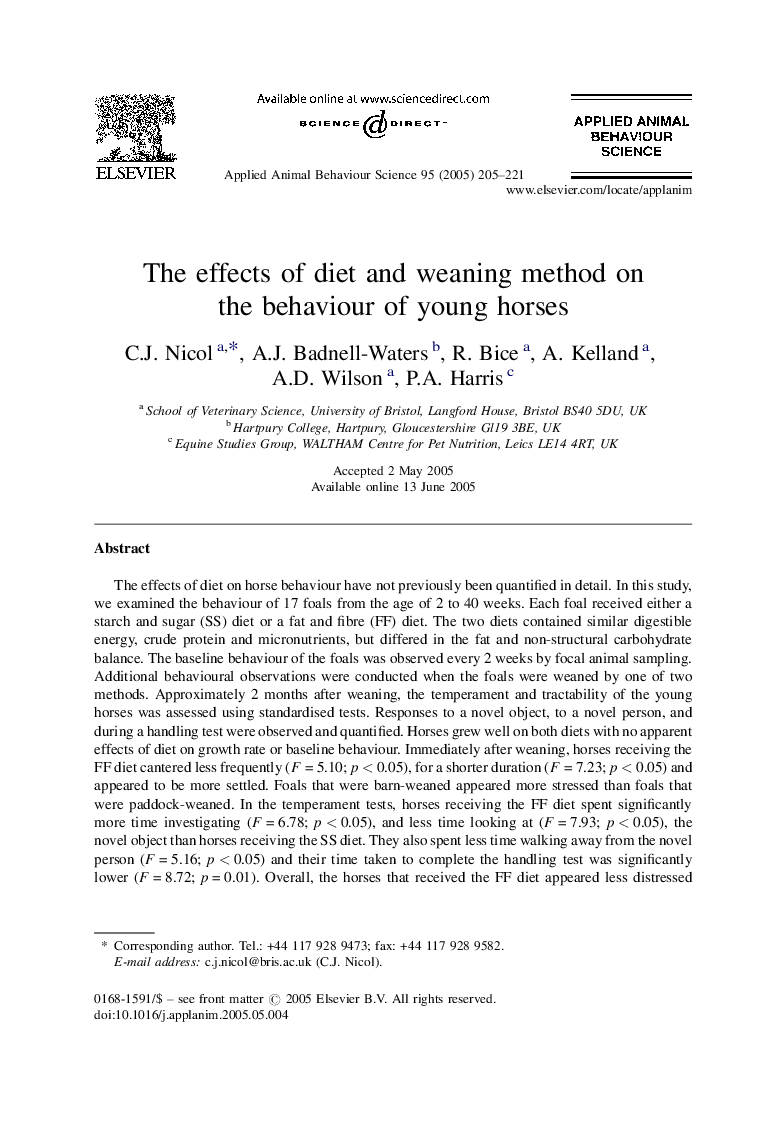| کد مقاله | کد نشریه | سال انتشار | مقاله انگلیسی | نسخه تمام متن |
|---|---|---|---|---|
| 9475832 | 1625450 | 2005 | 17 صفحه PDF | دانلود رایگان |
عنوان انگلیسی مقاله ISI
The effects of diet and weaning method on the behaviour of young horses
دانلود مقاله + سفارش ترجمه
دانلود مقاله ISI انگلیسی
رایگان برای ایرانیان
موضوعات مرتبط
علوم زیستی و بیوفناوری
علوم کشاورزی و بیولوژیک
علوم دامی و جانورشناسی
پیش نمایش صفحه اول مقاله

چکیده انگلیسی
The effects of diet on horse behaviour have not previously been quantified in detail. In this study, we examined the behaviour of 17 foals from the age of 2 to 40 weeks. Each foal received either a starch and sugar (SS) diet or a fat and fibre (FF) diet. The two diets contained similar digestible energy, crude protein and micronutrients, but differed in the fat and non-structural carbohydrate balance. The baseline behaviour of the foals was observed every 2 weeks by focal animal sampling. Additional behavioural observations were conducted when the foals were weaned by one of two methods. Approximately 2 months after weaning, the temperament and tractability of the young horses was assessed using standardised tests. Responses to a novel object, to a novel person, and during a handling test were observed and quantified. Horses grew well on both diets with no apparent effects of diet on growth rate or baseline behaviour. Immediately after weaning, horses receiving the FF diet cantered less frequently (F = 5.10; p < 0.05), for a shorter duration (F = 7.23; p < 0.05) and appeared to be more settled. Foals that were barn-weaned appeared more stressed than foals that were paddock-weaned. In the temperament tests, horses receiving the FF diet spent significantly more time investigating (F = 6.78; p < 0.05), and less time looking at (F = 7.93; p < 0.05), the novel object than horses receiving the SS diet. They also spent less time walking away from the novel person (F = 5.16; p < 0.05) and their time taken to complete the handling test was significantly lower (F = 8.72; p = 0.01). Overall, the horses that received the FF diet appeared less distressed immediately after weaning and seemed calmer and more inquisitive during a range of temperament tests.
ناشر
Database: Elsevier - ScienceDirect (ساینس دایرکت)
Journal: Applied Animal Behaviour Science - Volume 95, Issues 3â4, December 2005, Pages 205-221
Journal: Applied Animal Behaviour Science - Volume 95, Issues 3â4, December 2005, Pages 205-221
نویسندگان
C.J. Nicol, A.J. Badnell-Waters, R. Bice, A. Kelland, A.D. Wilson, P.A. Harris,